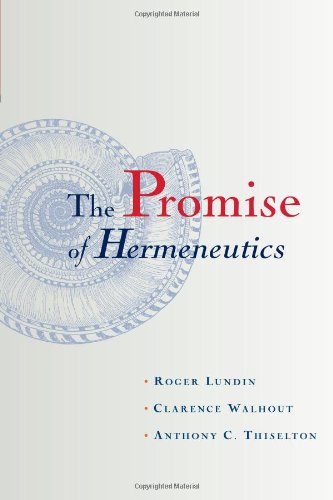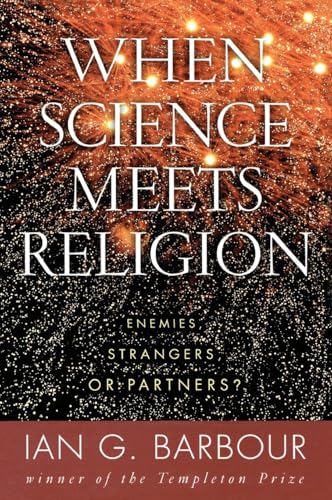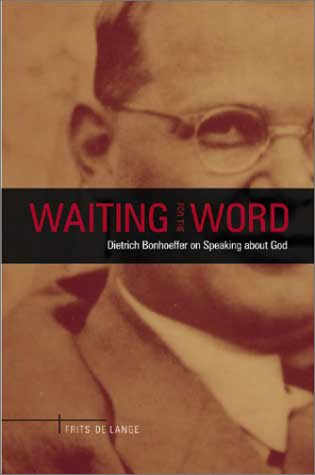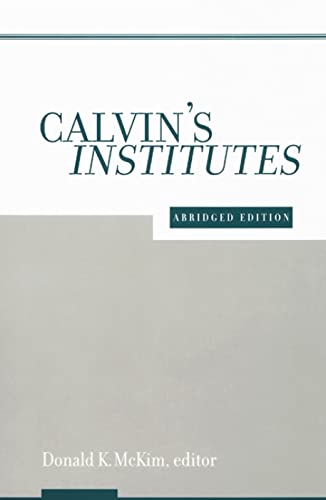The Promise of Hermeneutics
Written by Roger Lundin, Clarence Walhout and Anthony C. Thiselton Reviewed By Timothy WardThis fine book argues very clearly that there is great philosophical and theological support available for a hermeneutical position which steers away both from Enlightenment individualism, which pictures the interpreter as a single mind trying to understand the mind of the author, and from contemporary unconstrained textual indeterminacy, which regards interpretation as a kind of play. The two great hermeneutical theorists of the twentieth century, Paul Ricoeur and Hans-Georg Gadamer, are shown to provide profound philosophical resources for this alternative hermeneutical position, which sees authors and readers not just as ‘minds on legs’, or as mere players with words, but as ethical and responsible human subjects. (This book therefore builds on the authors’ earlier 1985 work The Responsibility of Hermeneutics.)
Any reader who wishes to be shown a clear hermeneutical position which escapes the problems of the false dichotomy often set up between ‘Enlightenment/Cartesian’ hermeneutics and ‘post-modern’ hermeneutics. would do very well to start here. This is the first aspect of the meaning of the book’s title: it outlines a very promising hermeneutical position. The book will be especially helpful in showing readers from different disciplines a wider academic context than they are perhaps aware of. It is encouraging to be shown that this hermeneutical position, which, as Thiselton rightly says, ‘coheres profoundly with Christian theology’ (134), can appeal for support to some of t he most heavy-weight philosophical minds of the last century—not only to Gadamer and Ricoeur, but also to Wittgenstein. Levinas. Plantinga and Wolterstorff. (Along the way the book provides excellent thumbnail sketches of some of the thought of these vitally important writers.) Whether you know a little or a lot about philosophical hermeneutics and epistemology, there is much to learn here.
In the first section of the book. Lundin offers one of the most stimulating analyses of modernity that one is likely to find in 60 odd pages. (A helpful crash-course in the hermeneutics of Hegel and Schleiermacher can be found here too, on 30ff.). His key concept is that of the orphan. He argues that the Cartesian attempt to break the self free from all constraints of tradition, has not made us free as it promised to do, but has left us lost and parent-less. History and tradition, it turns out, are just unavoidable and necessary in interpretation and knowledge, and don’t always get in the way. Walhout contributes the second section. His central argument is that textual meaning requires flesh-and-blood human authors. While interpretation includes the gaining of knowledge, it is in the end an ethical activity, for it is about learning from others how to live wisely (127). Any student of literature seeking a Christian perspective on the interpretation of literature will find Walhout’s closing comments especially helpful (130–31). Lundin’s analysis of how the key themes of modernity have been grappled with in literature are also fascinating in this regard (42–52). (Walhout and Lundin are both professors of English.)
The theologian Anthony Thiselton provides the third section. He begins by helpfully tying the three sections of the book together, and succeeds well in giving it overall coherence. He presupposes more background knowledge than either Walhout or Lundin—especially in the details of the sections on speech act theory—but the gaps could be filled in by chasing up the references he gives to his earlier works. Nevertheless, Thiselton’s section explains clearly the second aspect of the meaning of the book’s title, and brings its overall argument to a climax. Christian theology, he argues, offers a distinctive hermeneutic of trust and promise; the biblical God is, after all, a God who fundamentally makes promises. The heart of hermeneutics, he says, is ‘respect for the otherness of the other’—the opposite of self-absorption—and this is found not only in Gadamer and Ricoeur but fundamentally in the NT concept of agape (221–22).
Timothy Ward
Hinckley, Leicester






